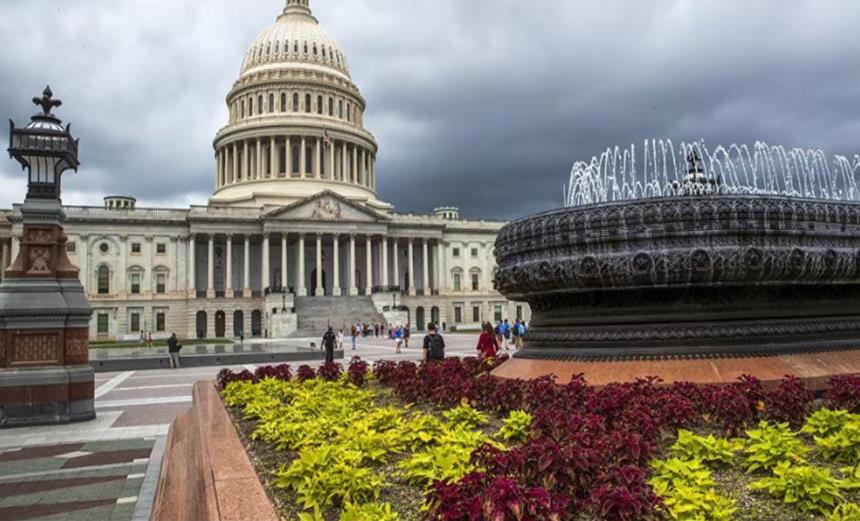你认为美国可能失去超级大国地位的最大原因是什么?(一)
正文翻译

What''s the biggest reason you think America could lose its standing as a superpower?
你认为美国可能失去超级大国地位的最大原因是什么?

What''s the biggest reason you think America could lose its standing as a superpower?
你认为美国可能失去超级大国地位的最大原因是什么?
评论翻译
Jonathan Buttall
(1) Profoundly incompetent leadership in the executive and congressional branches.
(2) Defeated in war by Vietnam and Afghanistan, two low tech countries, putting the lie that the most military hardware is what makes a military strong. What makes a military strong is if people are fighting for their country and have recent combat experience. Vietnam gave the Japanese a hard time and defeated the French before expelling the US from it’s invasion. Afghanistan previously had defeated the British Empire and the Soviet unx.
It’s irrelevant that Vietnam got help from other countries, as so did the US in all of it’s wars including the Revolutionary war).
(3) Instead of keeping the peace in the world, the US reverted to imperialist wars of aggression starting with Vietnam. We stopped being a “world policeman” by the late 1960s.
(4) The growing rise of China, both economically and militarily.
(5) Future superpowers will be economic ones, not military ones. Imperialism on a world scale is obsolete, the US is the last holdout and was not successful at this as were scores of other countries.
行政部门和国会部门极度无能的领导。
在战争中被越南和阿富汗这两个科技能力水平低下的国家击败,即这是一个谎言:军事硬件最多等同于军力强大。军队是否强大,取决于人们是否为国家而战,是否有最近的战斗经验。越南给了日本一段艰难的时期,并在驱逐美国入侵之前打败了法国人。阿富汗此前曾击败过大英帝国和苏联。
越南得到的其他国家的帮助于越南而言是无关紧要的,美国在包括独立战争在内的所有战争中也是如此
美国非但没有维护世界和平,反而从越南开始发动帝国主义侵略战争。到20世纪60年代末,美国就不再是“世界警察”。
中国在经济和军事上日益崛起。
未来的超级大国将是经济大国,而不是军事大国。世界范围内的帝国主义已经过时,美国是最后一个顽固分子,在这方面并不成功,其他几十个国家也是如此。
Silk Road
The biggest reason America could lose its superpower status is not China, Russia, or Iran. It's not climate change, cyberattacks, or terrorism. It's not even the pandemic, the debt, or the polarization.
It's something much more subtle, yet much more powerful: complacency.
Complacency is the state of being satisfied with the status quo, without striving for improvement or innovation. It's the attitude of "if it ain't broke, don't fix it".
It's the mindset of "we're number one, so we don't need to change". It's the habit of resting on one's laurels, taking things for granted, and ignoring the signs of decline.
Complacency is the enemy of progress, and progress is the essence of superpowerdom.
A superpower is not just a country with a large economy, a strong military, and a global influence.
A superpower is a country that constantly pushes the boundaries of science, technology, culture, and human potential.
A superpower is a country that sets the standards, shapes the trends, and leads the world in solving the most pressing challenges.
America has been that country for decades, but it is losing its edge.
美国可能失去超级大国地位的最大原因不是中国、俄罗斯或伊朗。这不是气候变化、网络攻击或恐怖主义;甚至不是疫情、债务或两极分化。
这是一种更微妙但影响更大的东西:自满。
自满是一种满足于现状的状态,而不寻求改进或创新。这是一种“如果它没有坏,就不要修理它”的态度。
这是一种“我们是第一,所以我们不需要改变”的心态。这是一种安于现状的习惯,认为一切都是理所当然的,忽视了衰退的迹象。
自满是进步的敌人,进步是超级大国的本质。
超级大国不仅仅是一个拥有庞大经济、强大军事力量的国家,还得拥有全球影响力。
超级大国是一个不断突破科学、技术、文化和人类潜力界限的国家。
超级大国是一个在解决最紧迫挑战方面制定标准、塑造趋势并引领世界的国家。
几十年来,美国一直是这样的国家,但它正在失去优势。
According to the 2023 Global Innovation Index, America ranks 11th in the world in innovation performance, behind countries like Switzerland, Sweden, South Korea, and Singapore.
According to the 2023 World Economic Forum's Global Competitiveness Report, America ranks 13th in the world in competitiveness, behind countries like Finland, Denmark, Taiwan, and Germany.
According to the 2023 Bloomberg Innovation Index, America ranks 15th in the world in innovation capacity, behind countries like Israel, Japan, France, and China.
These rankings are not just numbers. They reflect the reality that America is falling behind in areas that matter for the future: research and development, education and skills, entrepreneurship and creativity, digital transformation and sustainability.
These are the areas that will determine who will dominate the 21st century and beyond.
America cannot afford to be complacent. It cannot rely on its past achievements or its current advantages.
It cannot assume that it will always be ahead or that others will always follow. It cannot ignore the fact that the world is changing faster than ever and that new challengers are emerging every day.
America needs to wake up from its complacency and regain its sense of urgency and ambition.
It needs to invest more in innovation and education, foster a culture of risk-taking and experimentation, embrace diversity and collaboration, and adapt to the changing needs and expectations of the global community.
根据2023年全球创新指数,美国的创新表现排名世界第11位,落后于瑞士、瑞典、韩国和新加坡等国。
根据2023年世界经济论坛的《全球竞争力报告》,美国的竞争力排名世界第13位,落后于芬兰、丹麦、台湾(地区)和德国等国。
根据2023年彭博创新指数,美国的创新能力位居世界第15位,落后于以色列、日本、法国和中国等国。
这些排名不仅仅是数字。它们反映了一个现实,即美国在对未来至关重要的领域方面正在落后:研发、教育和技能、创业和创造力、数字化转型和可持续性。
这些领域将决定谁将主宰21世纪及以后的世界。
美国不能自满,它不能去依靠过去的成就或目前的优势。
它不能假设自己会永远领先,或者不能去假定别人永远会落后于它。它不能忽视这样一个事实,即世界的变化比以往任何时候都要快,每天都有新的挑战者出现。
美国需要从自满中清醒过来,重拾紧迫感和雄心。
它需要加大对创新和教育的投资,培养一种冒险和实验的文化,拥抱多样性和合作,并适应全球社会不断变化的需求和期望。
H.L. Chastain
How did the U.S. become a superpower in just 250+ years?
Size
We were literally able to expand over a massive landmass unchallenged. Sure, Native Americans did provide some resistance, but the technology and numbers of European immigrants were too great to resist. It gave us a ton of room to populate, which is key to being a superpower.
Immigration
Yes, immigration. The US became THE destination of immigrants. It was a new land full of opportunity. It was for anyone who wanted to start a new life based on the idea of general liberty. Sure, there were some caveats and issues, but overall it was incredibly different from what the rest of the world was offering. Immigration brought a lot of different minds and cultures to the US which spurred innovation and advancement.
Resources
Good farmland
Competitors
Canada is sparsely populated and confined to the North. We annexed a lot of Mexico’s land in the Mexican-American War too. The rest of the states in the Americas were a mess and or too small to compete which left the US, who was furthest along in economic development, virtually unchallenged in dominating both North and South America.
美国是如何在短短250多年内成为超级大国的?
国土面积
我们确实能够在一块巨大的陆地上扩张而不受挑战。当然,美洲原住民确实带来了一些抵抗,但欧洲移民的科技和数量带来的优势太大,让其无法抵抗。它给了我们很大的生存空间,这是成为超级大国的关键。
移民
是的,移民。美国成了移民的目的地。这是一片充满机遇的新土地。这是为那些想在普遍自由的基础上开始新生活的人准备的。当然,也有一些警告和问题,但总的来说,它与世界其他地区提供的服务有着惊人的不同。移民给美国带来了许多不同的思想和文化,这激发了创新和进步。
资源
肥沃的田地
竞争对手
加拿大人口稀少,只局限于北部。我们在美墨战争中也吞并了很多墨西哥的土地。美洲的其他国家一团糟,规模太小,无法于美国竞争,这使得经济发展最快的美国在主导北美和南美方面几乎没有受到挑战。
War
The US fought a decent amount of wars prior to WWI, but nearly all of them were on their own continent. WWI brought the US the opportunity to engage internationally with other developed nations. While WWI destroyed Europe, the US profited by selling goods to them and swooping in near the end to help break the stalemate. Then comes WWII. Once again, the rest of Europe is destroyed and even the great British Empire has exhausted itself. The new USSR expended millions of soldiers fighting, much more than the US. This leaves the US in a superb position as having no realistic competitor outside the USSR. Come on Cold War!
Money and the Economy
Do you know what the US did during all these years? It advanced. During the 1800s it built a massive industrialized manufacturing base and became and economic powerhouse before war was even a factor. Come WWI and especially WWII, while the world fought, the US sold. WWII made the US a lot of money. Since WWII destroyed Europe, the US was left as the only major power left to produce goods. The US was the developed world for a time after WWII. It spend decades after this cementing its status as the central economy to the rest of the world.
So, in retrospect, a number of factors gave us our superpower status. Money, size, resources, industrialization, war, and good timing led the US to go from a nothing agricultural colony to a global superpower.
战争
在第一次世界大战之前,美国打过相当多的战争,但几乎所有的战争都在自己的大陆上。第一次世界大战给美国带来了与其他发达国家进行国际交往的机会。当第一次世界大战摧毁了欧洲时,美国通过向他们出售商品并在接近尾声时突袭以帮助打破僵局而获利。然后是第二次世界大战。欧洲其他地区再一次被摧毁,甚至伟大的大英帝国也已经筋疲力尽了。新苏联投入了无数士兵参与作战,比美国多得多。这使美国处于一个极好的地位,因为在苏联之外没有现实的竞争对手了,来吧,冷战!
货币与经济
你知道美国在这些年里做了什么吗?搞发展。在19世纪,它建立了一个大规模的工业化制造基地,并在战前成为经济强国。在第一次世界大战,尤其是第二次世界大战中,当全世界都在战斗时,美国再大力出售物资。第二次世界大战让美国赚了很多钱。自二战摧毁欧洲以来,美国成为唯一一个生产商品的大国。二战后,美国曾一度是发达国家。在这之后的几十年里,它一直在巩固自己作为世界其他地区中心经济体的地位。
所以,回顾过去,很多因素造就了我们的超级大国地位。金钱、规模、资源、工业化、战争和良好的时机使美国从一个无足轻重的农业殖民地变成了一个全球超级大国。
Abhishek Kumar
How did America become a superpower?
In November 1928, ten years after the Entente’s victory in the First World War, an official at the Foreign Office sat to compose a stark assessment of the new global order in which Britain found herself. Russia, Germany, France, Japan, Italy and China were all locked in spirals of revolution and repression, and were being crippled by successive financial crises.
Although the UK was “still staggering from the effects of the superhuman effort made during the war . . . loaded with a great burden of debt . . . [and] crippled by the evil of unemployment”, it was better off than most. The empire was still intact – albeit in an altered state – and the domestic polity had survived the arrival of mass democracy in 1918, notwithstanding scares such as the General Strike of 1926. But in 1928, a year before the Wall Street Crash, one country stood supreme above all the others. In the United States, the official wrote, Great Britain was faced “with a phenomenon for which there is no parallel in our modern history – a state twenty-five times as large, five times as wealthy, three times as populous, twice as ambitious, almost invulnerable, and at least our equal in prosperity, vital energy, technical equipment and industrial strength”.
美国是如何成为超级大国的?
1928年11月,协约国在第一次世界大战中获胜10年后,英国外交部的一名官员坐下来对英国所处的全球新秩序进行了一份严苛的评估。俄罗斯、德国、法国、日本、意大利和中国都陷入了革命和镇压的漩涡,并因接连发生的金融危机而陷入瘫痪。
尽管英国“因战争期间的巨大投入而仍然对英国产生惊人的影响:背负着巨大的债务负担,因易造成伤害的失业情况而面临严重问题”,但它仍然比大多数国家都要好。帝国仍然完好无损——尽管状态发生了变化——国内政体在1918年大规模民主的到来中幸存下来——尽管出现了1926年的总罢工等恐慌。但在1928年,也就是华尔街崩盘的前一年,有一个国家凌驾于所有其他国家之上。这位官员写道,英国面临着这样的情况:“美国有着我们现代历史上绝无仅有的现象——国土面积二十五倍于我们的国家,财富五倍于我们的国家,人口三倍于我们的国家,野心两倍于我们的国家,几乎坚不可摧,至少在繁荣、活力、技术设备和工业实力方面与我们势均力敌”。
In 1917, Germany’s suicidal U-boat campaign in the Atlantic had finally forced President Woodrow Wilson to drop his position of disapproving neutrality in the war. When the United States finally entered the arena, the door to the American century was not so much unlocked as blown off its hinges – and in came a hurricane.
Tells two stories, neither of which (and this is the point) can be told with-out the other. The first is America’s coming of age as a superpower on a scale that the world had never seen and that frightened Americans as much as anyone else. The second is the way in which the other great powers – winners and losers in the First World War, from Europe to Eurasia – came to terms with the new dispensation.
1917年,德国在大西洋的自杀式的U型潜艇战役最终迫使伍德罗·威尔逊总统放弃了“不赞成卷入战争”的中立立场。当美国最终进入战场时,通往美国世纪的大门与其说锁得不严密,不如说铰链被炸开了——随之而来的是一场飓风。
告诉你两个故事,这两个故事(这就是重点)都不能分开来讲。第一个是美国成长为超级大国,其规模之大是世界从未见过的,这让美国人和其他人一样感到害怕。第二个是其他大国——从欧洲到欧亚大陆,第一次世界大战的赢家和输家——就新的局势达成协议。
Tooze is a professor of history and co-director of the international security studies programme at Yale, the intellectual home of “grand strategy” – a form of history, much beloved of statesmen, which abandons the usual “firewall” between domestic politics and foreign policy and examines how states mobilise the totality of their assets to the ends of security and power. This book is the best example of the genre since The Rise and Fall of the Great Powers (1987), produced by another British historian at Yale, Paul Kennedy. Tooze’s own previous book was a world-renowned, prize-winning study of the Nazi war economy, and in The Deluge he brings the same depth of analysis to the interwar period, covering much familiar ground but offering a bold reconceptuali-sation of the making and breaking of the liberal international order.
Tooze是耶鲁大学的历史学教授和国际安全研究项目的联合主任,耶鲁大学是“大战略”的思想家园,这是一种深受政治家喜爱的历史形式,它摒弃了国内政治和外交政策之间通常的“防火墙”,并研究了各国如何将其全部资产来实现安全和权力的目的。这本书是自耶鲁大学另一位英国历史学家保罗·肯尼迪撰写的《大国的兴衰》(1987年)以来这一类型的最好例子。Tooze自己的前一本书是一本世界知名的、获奖的关于纳粹战争经济的研究,在《大洪水》中,他对两次世界大战之间的时期进行了同样深入的分析,涵盖了许多熟悉的领域,但对自由国际秩序的建立和打破大胆的进行重新定义。
For Britain, which had paid for the Great War with huge loans from US banks, it was a case of “improvise or die”.It was in the interwar period that the British attempted “feats of intervention, co-ordination and stabilisation to which they had never aspired in the empire’s heyday”. But crucially, rather than push back against American hegemony, they accepted it as a fait accompli. Winston Churchill was among the first to see the selfish strategic interest in what he later called the “special relationship” but there were few dissenting voices; Britain’s first Labour prime minister, Ramsay MacDonald, was as staunch an advocate of an Anglo-American alliance as any. As Leon Trotsky put it, MacDonald “points with pride to this dog collar, calling it the best instrument of peace”.
In Weimar Germany from 1923 to 1927, Gustav Stresemann’s foreign policy was predicated on a similar logic, reconciling himself to US power. Yet others began to obxt to the shackles imposed by the new behemoth on the block, and what they saw as an attempt to impose a stifling status quo. In 1928, the Austrian-born radical politician Adolf Hitler warned that the “threatened global hegemony of the North American continent” would reduce the rest of the major powers to the status of a Switzerland or a Holland. In Mein Kampf, he even called for an Anglo-German alliance to resist it.
对于从美国银行获得巨额贷款以支付第一次世界大战费用的英国来说,这是一个“要么即兴发挥,要么死亡”的问题。正是在两次世界大战期间,英国人尝试了“他们在帝国鼎盛时期从未渴望过的干预、协调和稳定的壮举”。但至关重要的是,他们并没有反击美国的霸权,而是将其视为既成事实。温斯顿·丘吉尔是最早在他后来所说的“特殊关系”中看到自私战略利益的人之一,但几乎没有反对的声音;英国第一任工党党魁拉姆齐·麦克唐纳(Ramsay MacDonald)是英美联盟的坚定倡导者。正如莱昂·托洛茨基所说,麦克唐纳“自豪地指着这只狗项圈,称之为最好的和平工具”。
1923年至1927年,在魏玛德国,古斯塔夫·斯特雷塞曼的外交政策基于类似的逻辑,向美国的力量妥协。然而,其他人开始反对这个新庞然大物施加的枷锁,他们认为这是企图强行维持令人窒息的现状。1928年,奥地利出生的激进政治家阿道夫·希特勒警告说,“北美大陆的霸权”将使其他大国沦为瑞士或荷兰那样的地位。在《我的奋斗》一书中,他甚至呼吁英德联盟来抵制它。
The 1929 Wall Street Crash confirmed that now, when America sneezed, the rest of the world caught much worse than a cold. Hedging one’s bets on the superpower’s next move was a risky business, however, as the inner workings of American democracy were complex. Woodrow Wilson could convince the world of his vision for a League of Nations, but not the American people.
In 1931, when Congress slapped down President Hoover’s offer of a moratorium on European war debt – which had been made to protect Wall Street investment in Germany, rather than in a spirit of benevolence – the exasperated British ambassador in Washington, Sir Ronald Lindsay, called it an “exhibition of irresponsibility, buffoonery and ineptitude that could hardly be paralleled by the Haitian legislature”.
By the 1930s, for all their differences, the leaders of Fascist Italy, Nazi Germany, Imperial Japan and the Soviet unx began to unite as insurgents against this oppressive Pax Americana. Indeed, one of the great ironies of the Great Depression era was that it was the rebellious nationalist camp that adopted “positive” economic policies, in contrast to the austerity and deflationary orthodoxy preferred by defenders of the liberal order. As Stalin told factory workers in 1931, at the outset of his Five-Year Plans, “To slacken the pace would mean to lag behind, and those who lag behind are beaten.”
1929年的华尔街大崩盘证实,现在美国打个喷嚏,世界其他地方就会受到比感冒更严重的影响。然而,由于美国民主的内部运作是复杂的,因此对这个超级大国的下一步行动进行下注是一件冒险的事情。伍德罗·威尔逊(Woodrow Wilson)可以让全世界相信他建立国际联盟的愿景,但不能让美国人民相信。
1931年,美国国会否决了胡佛总统提出的延缓欧洲战争债务的提议——该提议是为了保护华尔街在德国的投资,而非出于仁慈之心——愤怒的英国驻华盛顿大使罗纳德?林赛爵士(Sir Ronald Lindsay)称其为“这是海地立法机构难以比拟的不负责任、滑稽和无能的表现”。
到20世纪30年代,尽管存在种种分歧,法西斯意大利、纳粹德国、日本帝国和苏联的领导人开始联合起来,作为反抗这种压迫性的“美国治下的和平”(Pax Americana)的叛乱分子。事实上,大萧条时期最大的讽刺之一是,正是反叛的民族主义阵营采取了“积极”的经济政策,而自由秩序捍卫者偏爱(经济的)紧缩和通货紧缩的正统说法。1931年,斯大林在他的五年计划开始时告诉工厂工人:“放慢步伐就意味着落后,落后就会挨打。”
Some have seen the collapse of the peace movement, disintegration of the liberal order and insipidness of the League of Nations as the ultimate rebuke to the naive democratic idealism of the interwar years, embodied by Wilsonianism. For Tooze, this is the wrong lesson to learn. In his view, in fact, “the restless search for a new way of securing order and peace was the expression not of deluded idealism, but of a higher form of realism”. Its failure was not inevitable and can be explained in two ways.
The first was the determination of revanchist (fascist and revolutionary) powers that mobilised every resource they had in an effort to escape the “chain gang” of nations marching behind the US. The second, more important, was that America itself remained a reluctant Goliath, hamstrung in its attempt to construct a viable grand strategy by a strange anxiety about its own fragility. Thus Wilson appears as not a naive internationalist, but a Burkean conservative, deeply concerned by the prospect that foreign entanglements with the “Dark Continent” of Europe or the “Oriental races” of Asia would corrupt the health and vigour of the American republic.
一些人认为,和平运动的崩溃、自由秩序的瓦解和国际联盟的平淡,是对威尔逊主义所体现的两次世界大战时期天真的民主理想主义的最终谴责。对Tooze来说,这是一个错误的教训。事实上,在他看来,,“对确保秩序与和平的新方式的孜孜不倦的探索并不是自欺欺人的理想主义的表现,而是一种更高形式的现实主义的表现”。它的失败并非不可避免,可以从两个方面来解释。
第一个是复仇主义(法西斯和革命)势力的决心,他们调动了一切资源,努力摆脱跟随美国的“一帮匪徒”国家。第二个更重要的是,美国本身仍然仅仅勉强算“哥利亚”,对自身脆弱性的一种奇怪的焦虑,让其试图构建一个可行的大战略的努力受阻。这样看来,威尔逊就不是一个天真的国际主义者了,而是一个坎尼斯·伯克式的保守主义者了,深感忧虑的是,与欧洲“黑暗大陆”或亚洲“东方种族”的外交纠葛将败坏美利坚共和国的健康和活力。
Here was the paradox: “At the hub of the rapidly evolving American-centred world system was a polity wedded to a conservative vision of its own future.”
The Deluge leaves us with a picture not of the clichéd brash and unthinking Yankee new imperialist power, but of an oddly insecure superstate: preferring to sit aloof from the rapacious battles and power games played by others; not quite at ease with its own recent tumultuous past; and still coming to terms with modernity having presented it with responsibilities that it had never envisaged.
From the British perspective, as the Foreign Office official put it in 1928, it was always better to have America in the game than out of it. The problem was that “in almost every field, the advantages to be derived from mutual co-operation are greater for us than for them”.
这是一个悖论:“在以美国为中心的快速发展的世界体系的中心,是一个对自己未来持保守看法的政体。”
《大洪水》给我们留下的画面不是陈词滥调的傲慢和不假思索的美国佬新的帝国主义势力,而是一个奇怪的不安全的超级大国:宁愿远离贪婪的战争和别人玩的权力游戏;对自己最近动荡的过去不太放心;并且仍在与现代性妥协,但现代性赋予了它从未设想过的责任。
正如这位英国外交部官员在1928年所说的那样,从英国的角度来看,让美国参与总比让美国退出要好。问题在于,“在几乎所有领域,我们从相互合作中获得的好处都大于他们”。
(1) Profoundly incompetent leadership in the executive and congressional branches.
(2) Defeated in war by Vietnam and Afghanistan, two low tech countries, putting the lie that the most military hardware is what makes a military strong. What makes a military strong is if people are fighting for their country and have recent combat experience. Vietnam gave the Japanese a hard time and defeated the French before expelling the US from it’s invasion. Afghanistan previously had defeated the British Empire and the Soviet unx.
It’s irrelevant that Vietnam got help from other countries, as so did the US in all of it’s wars including the Revolutionary war).
(3) Instead of keeping the peace in the world, the US reverted to imperialist wars of aggression starting with Vietnam. We stopped being a “world policeman” by the late 1960s.
(4) The growing rise of China, both economically and militarily.
(5) Future superpowers will be economic ones, not military ones. Imperialism on a world scale is obsolete, the US is the last holdout and was not successful at this as were scores of other countries.
行政部门和国会部门极度无能的领导。
在战争中被越南和阿富汗这两个科技能力水平低下的国家击败,即这是一个谎言:军事硬件最多等同于军力强大。军队是否强大,取决于人们是否为国家而战,是否有最近的战斗经验。越南给了日本一段艰难的时期,并在驱逐美国入侵之前打败了法国人。阿富汗此前曾击败过大英帝国和苏联。
越南得到的其他国家的帮助于越南而言是无关紧要的,美国在包括独立战争在内的所有战争中也是如此
美国非但没有维护世界和平,反而从越南开始发动帝国主义侵略战争。到20世纪60年代末,美国就不再是“世界警察”。
中国在经济和军事上日益崛起。
未来的超级大国将是经济大国,而不是军事大国。世界范围内的帝国主义已经过时,美国是最后一个顽固分子,在这方面并不成功,其他几十个国家也是如此。
Silk Road
The biggest reason America could lose its superpower status is not China, Russia, or Iran. It's not climate change, cyberattacks, or terrorism. It's not even the pandemic, the debt, or the polarization.
It's something much more subtle, yet much more powerful: complacency.
Complacency is the state of being satisfied with the status quo, without striving for improvement or innovation. It's the attitude of "if it ain't broke, don't fix it".
It's the mindset of "we're number one, so we don't need to change". It's the habit of resting on one's laurels, taking things for granted, and ignoring the signs of decline.
Complacency is the enemy of progress, and progress is the essence of superpowerdom.
A superpower is not just a country with a large economy, a strong military, and a global influence.
A superpower is a country that constantly pushes the boundaries of science, technology, culture, and human potential.
A superpower is a country that sets the standards, shapes the trends, and leads the world in solving the most pressing challenges.
America has been that country for decades, but it is losing its edge.
美国可能失去超级大国地位的最大原因不是中国、俄罗斯或伊朗。这不是气候变化、网络攻击或恐怖主义;甚至不是疫情、债务或两极分化。
这是一种更微妙但影响更大的东西:自满。
自满是一种满足于现状的状态,而不寻求改进或创新。这是一种“如果它没有坏,就不要修理它”的态度。
这是一种“我们是第一,所以我们不需要改变”的心态。这是一种安于现状的习惯,认为一切都是理所当然的,忽视了衰退的迹象。
自满是进步的敌人,进步是超级大国的本质。
超级大国不仅仅是一个拥有庞大经济、强大军事力量的国家,还得拥有全球影响力。
超级大国是一个不断突破科学、技术、文化和人类潜力界限的国家。
超级大国是一个在解决最紧迫挑战方面制定标准、塑造趋势并引领世界的国家。
几十年来,美国一直是这样的国家,但它正在失去优势。
According to the 2023 Global Innovation Index, America ranks 11th in the world in innovation performance, behind countries like Switzerland, Sweden, South Korea, and Singapore.
According to the 2023 World Economic Forum's Global Competitiveness Report, America ranks 13th in the world in competitiveness, behind countries like Finland, Denmark, Taiwan, and Germany.
According to the 2023 Bloomberg Innovation Index, America ranks 15th in the world in innovation capacity, behind countries like Israel, Japan, France, and China.
These rankings are not just numbers. They reflect the reality that America is falling behind in areas that matter for the future: research and development, education and skills, entrepreneurship and creativity, digital transformation and sustainability.
These are the areas that will determine who will dominate the 21st century and beyond.
America cannot afford to be complacent. It cannot rely on its past achievements or its current advantages.
It cannot assume that it will always be ahead or that others will always follow. It cannot ignore the fact that the world is changing faster than ever and that new challengers are emerging every day.
America needs to wake up from its complacency and regain its sense of urgency and ambition.
It needs to invest more in innovation and education, foster a culture of risk-taking and experimentation, embrace diversity and collaboration, and adapt to the changing needs and expectations of the global community.
根据2023年全球创新指数,美国的创新表现排名世界第11位,落后于瑞士、瑞典、韩国和新加坡等国。
根据2023年世界经济论坛的《全球竞争力报告》,美国的竞争力排名世界第13位,落后于芬兰、丹麦、台湾(地区)和德国等国。
根据2023年彭博创新指数,美国的创新能力位居世界第15位,落后于以色列、日本、法国和中国等国。
这些排名不仅仅是数字。它们反映了一个现实,即美国在对未来至关重要的领域方面正在落后:研发、教育和技能、创业和创造力、数字化转型和可持续性。
这些领域将决定谁将主宰21世纪及以后的世界。
美国不能自满,它不能去依靠过去的成就或目前的优势。
它不能假设自己会永远领先,或者不能去假定别人永远会落后于它。它不能忽视这样一个事实,即世界的变化比以往任何时候都要快,每天都有新的挑战者出现。
美国需要从自满中清醒过来,重拾紧迫感和雄心。
它需要加大对创新和教育的投资,培养一种冒险和实验的文化,拥抱多样性和合作,并适应全球社会不断变化的需求和期望。
H.L. Chastain
How did the U.S. become a superpower in just 250+ years?
Size
We were literally able to expand over a massive landmass unchallenged. Sure, Native Americans did provide some resistance, but the technology and numbers of European immigrants were too great to resist. It gave us a ton of room to populate, which is key to being a superpower.
Immigration
Yes, immigration. The US became THE destination of immigrants. It was a new land full of opportunity. It was for anyone who wanted to start a new life based on the idea of general liberty. Sure, there were some caveats and issues, but overall it was incredibly different from what the rest of the world was offering. Immigration brought a lot of different minds and cultures to the US which spurred innovation and advancement.
Resources
Good farmland
Competitors
Canada is sparsely populated and confined to the North. We annexed a lot of Mexico’s land in the Mexican-American War too. The rest of the states in the Americas were a mess and or too small to compete which left the US, who was furthest along in economic development, virtually unchallenged in dominating both North and South America.
美国是如何在短短250多年内成为超级大国的?
国土面积
我们确实能够在一块巨大的陆地上扩张而不受挑战。当然,美洲原住民确实带来了一些抵抗,但欧洲移民的科技和数量带来的优势太大,让其无法抵抗。它给了我们很大的生存空间,这是成为超级大国的关键。
移民
是的,移民。美国成了移民的目的地。这是一片充满机遇的新土地。这是为那些想在普遍自由的基础上开始新生活的人准备的。当然,也有一些警告和问题,但总的来说,它与世界其他地区提供的服务有着惊人的不同。移民给美国带来了许多不同的思想和文化,这激发了创新和进步。
资源
肥沃的田地
竞争对手
加拿大人口稀少,只局限于北部。我们在美墨战争中也吞并了很多墨西哥的土地。美洲的其他国家一团糟,规模太小,无法于美国竞争,这使得经济发展最快的美国在主导北美和南美方面几乎没有受到挑战。
War
The US fought a decent amount of wars prior to WWI, but nearly all of them were on their own continent. WWI brought the US the opportunity to engage internationally with other developed nations. While WWI destroyed Europe, the US profited by selling goods to them and swooping in near the end to help break the stalemate. Then comes WWII. Once again, the rest of Europe is destroyed and even the great British Empire has exhausted itself. The new USSR expended millions of soldiers fighting, much more than the US. This leaves the US in a superb position as having no realistic competitor outside the USSR. Come on Cold War!
Money and the Economy
Do you know what the US did during all these years? It advanced. During the 1800s it built a massive industrialized manufacturing base and became and economic powerhouse before war was even a factor. Come WWI and especially WWII, while the world fought, the US sold. WWII made the US a lot of money. Since WWII destroyed Europe, the US was left as the only major power left to produce goods. The US was the developed world for a time after WWII. It spend decades after this cementing its status as the central economy to the rest of the world.
So, in retrospect, a number of factors gave us our superpower status. Money, size, resources, industrialization, war, and good timing led the US to go from a nothing agricultural colony to a global superpower.
战争
在第一次世界大战之前,美国打过相当多的战争,但几乎所有的战争都在自己的大陆上。第一次世界大战给美国带来了与其他发达国家进行国际交往的机会。当第一次世界大战摧毁了欧洲时,美国通过向他们出售商品并在接近尾声时突袭以帮助打破僵局而获利。然后是第二次世界大战。欧洲其他地区再一次被摧毁,甚至伟大的大英帝国也已经筋疲力尽了。新苏联投入了无数士兵参与作战,比美国多得多。这使美国处于一个极好的地位,因为在苏联之外没有现实的竞争对手了,来吧,冷战!
货币与经济
你知道美国在这些年里做了什么吗?搞发展。在19世纪,它建立了一个大规模的工业化制造基地,并在战前成为经济强国。在第一次世界大战,尤其是第二次世界大战中,当全世界都在战斗时,美国再大力出售物资。第二次世界大战让美国赚了很多钱。自二战摧毁欧洲以来,美国成为唯一一个生产商品的大国。二战后,美国曾一度是发达国家。在这之后的几十年里,它一直在巩固自己作为世界其他地区中心经济体的地位。
所以,回顾过去,很多因素造就了我们的超级大国地位。金钱、规模、资源、工业化、战争和良好的时机使美国从一个无足轻重的农业殖民地变成了一个全球超级大国。
Abhishek Kumar
How did America become a superpower?
In November 1928, ten years after the Entente’s victory in the First World War, an official at the Foreign Office sat to compose a stark assessment of the new global order in which Britain found herself. Russia, Germany, France, Japan, Italy and China were all locked in spirals of revolution and repression, and were being crippled by successive financial crises.
Although the UK was “still staggering from the effects of the superhuman effort made during the war . . . loaded with a great burden of debt . . . [and] crippled by the evil of unemployment”, it was better off than most. The empire was still intact – albeit in an altered state – and the domestic polity had survived the arrival of mass democracy in 1918, notwithstanding scares such as the General Strike of 1926. But in 1928, a year before the Wall Street Crash, one country stood supreme above all the others. In the United States, the official wrote, Great Britain was faced “with a phenomenon for which there is no parallel in our modern history – a state twenty-five times as large, five times as wealthy, three times as populous, twice as ambitious, almost invulnerable, and at least our equal in prosperity, vital energy, technical equipment and industrial strength”.
美国是如何成为超级大国的?
1928年11月,协约国在第一次世界大战中获胜10年后,英国外交部的一名官员坐下来对英国所处的全球新秩序进行了一份严苛的评估。俄罗斯、德国、法国、日本、意大利和中国都陷入了革命和镇压的漩涡,并因接连发生的金融危机而陷入瘫痪。
尽管英国“因战争期间的巨大投入而仍然对英国产生惊人的影响:背负着巨大的债务负担,因易造成伤害的失业情况而面临严重问题”,但它仍然比大多数国家都要好。帝国仍然完好无损——尽管状态发生了变化——国内政体在1918年大规模民主的到来中幸存下来——尽管出现了1926年的总罢工等恐慌。但在1928年,也就是华尔街崩盘的前一年,有一个国家凌驾于所有其他国家之上。这位官员写道,英国面临着这样的情况:“美国有着我们现代历史上绝无仅有的现象——国土面积二十五倍于我们的国家,财富五倍于我们的国家,人口三倍于我们的国家,野心两倍于我们的国家,几乎坚不可摧,至少在繁荣、活力、技术设备和工业实力方面与我们势均力敌”。
In 1917, Germany’s suicidal U-boat campaign in the Atlantic had finally forced President Woodrow Wilson to drop his position of disapproving neutrality in the war. When the United States finally entered the arena, the door to the American century was not so much unlocked as blown off its hinges – and in came a hurricane.
Tells two stories, neither of which (and this is the point) can be told with-out the other. The first is America’s coming of age as a superpower on a scale that the world had never seen and that frightened Americans as much as anyone else. The second is the way in which the other great powers – winners and losers in the First World War, from Europe to Eurasia – came to terms with the new dispensation.
1917年,德国在大西洋的自杀式的U型潜艇战役最终迫使伍德罗·威尔逊总统放弃了“不赞成卷入战争”的中立立场。当美国最终进入战场时,通往美国世纪的大门与其说锁得不严密,不如说铰链被炸开了——随之而来的是一场飓风。
告诉你两个故事,这两个故事(这就是重点)都不能分开来讲。第一个是美国成长为超级大国,其规模之大是世界从未见过的,这让美国人和其他人一样感到害怕。第二个是其他大国——从欧洲到欧亚大陆,第一次世界大战的赢家和输家——就新的局势达成协议。
Tooze is a professor of history and co-director of the international security studies programme at Yale, the intellectual home of “grand strategy” – a form of history, much beloved of statesmen, which abandons the usual “firewall” between domestic politics and foreign policy and examines how states mobilise the totality of their assets to the ends of security and power. This book is the best example of the genre since The Rise and Fall of the Great Powers (1987), produced by another British historian at Yale, Paul Kennedy. Tooze’s own previous book was a world-renowned, prize-winning study of the Nazi war economy, and in The Deluge he brings the same depth of analysis to the interwar period, covering much familiar ground but offering a bold reconceptuali-sation of the making and breaking of the liberal international order.
Tooze是耶鲁大学的历史学教授和国际安全研究项目的联合主任,耶鲁大学是“大战略”的思想家园,这是一种深受政治家喜爱的历史形式,它摒弃了国内政治和外交政策之间通常的“防火墙”,并研究了各国如何将其全部资产来实现安全和权力的目的。这本书是自耶鲁大学另一位英国历史学家保罗·肯尼迪撰写的《大国的兴衰》(1987年)以来这一类型的最好例子。Tooze自己的前一本书是一本世界知名的、获奖的关于纳粹战争经济的研究,在《大洪水》中,他对两次世界大战之间的时期进行了同样深入的分析,涵盖了许多熟悉的领域,但对自由国际秩序的建立和打破大胆的进行重新定义。
For Britain, which had paid for the Great War with huge loans from US banks, it was a case of “improvise or die”.It was in the interwar period that the British attempted “feats of intervention, co-ordination and stabilisation to which they had never aspired in the empire’s heyday”. But crucially, rather than push back against American hegemony, they accepted it as a fait accompli. Winston Churchill was among the first to see the selfish strategic interest in what he later called the “special relationship” but there were few dissenting voices; Britain’s first Labour prime minister, Ramsay MacDonald, was as staunch an advocate of an Anglo-American alliance as any. As Leon Trotsky put it, MacDonald “points with pride to this dog collar, calling it the best instrument of peace”.
In Weimar Germany from 1923 to 1927, Gustav Stresemann’s foreign policy was predicated on a similar logic, reconciling himself to US power. Yet others began to obxt to the shackles imposed by the new behemoth on the block, and what they saw as an attempt to impose a stifling status quo. In 1928, the Austrian-born radical politician Adolf Hitler warned that the “threatened global hegemony of the North American continent” would reduce the rest of the major powers to the status of a Switzerland or a Holland. In Mein Kampf, he even called for an Anglo-German alliance to resist it.
对于从美国银行获得巨额贷款以支付第一次世界大战费用的英国来说,这是一个“要么即兴发挥,要么死亡”的问题。正是在两次世界大战期间,英国人尝试了“他们在帝国鼎盛时期从未渴望过的干预、协调和稳定的壮举”。但至关重要的是,他们并没有反击美国的霸权,而是将其视为既成事实。温斯顿·丘吉尔是最早在他后来所说的“特殊关系”中看到自私战略利益的人之一,但几乎没有反对的声音;英国第一任工党党魁拉姆齐·麦克唐纳(Ramsay MacDonald)是英美联盟的坚定倡导者。正如莱昂·托洛茨基所说,麦克唐纳“自豪地指着这只狗项圈,称之为最好的和平工具”。
1923年至1927年,在魏玛德国,古斯塔夫·斯特雷塞曼的外交政策基于类似的逻辑,向美国的力量妥协。然而,其他人开始反对这个新庞然大物施加的枷锁,他们认为这是企图强行维持令人窒息的现状。1928年,奥地利出生的激进政治家阿道夫·希特勒警告说,“北美大陆的霸权”将使其他大国沦为瑞士或荷兰那样的地位。在《我的奋斗》一书中,他甚至呼吁英德联盟来抵制它。
The 1929 Wall Street Crash confirmed that now, when America sneezed, the rest of the world caught much worse than a cold. Hedging one’s bets on the superpower’s next move was a risky business, however, as the inner workings of American democracy were complex. Woodrow Wilson could convince the world of his vision for a League of Nations, but not the American people.
In 1931, when Congress slapped down President Hoover’s offer of a moratorium on European war debt – which had been made to protect Wall Street investment in Germany, rather than in a spirit of benevolence – the exasperated British ambassador in Washington, Sir Ronald Lindsay, called it an “exhibition of irresponsibility, buffoonery and ineptitude that could hardly be paralleled by the Haitian legislature”.
By the 1930s, for all their differences, the leaders of Fascist Italy, Nazi Germany, Imperial Japan and the Soviet unx began to unite as insurgents against this oppressive Pax Americana. Indeed, one of the great ironies of the Great Depression era was that it was the rebellious nationalist camp that adopted “positive” economic policies, in contrast to the austerity and deflationary orthodoxy preferred by defenders of the liberal order. As Stalin told factory workers in 1931, at the outset of his Five-Year Plans, “To slacken the pace would mean to lag behind, and those who lag behind are beaten.”
1929年的华尔街大崩盘证实,现在美国打个喷嚏,世界其他地方就会受到比感冒更严重的影响。然而,由于美国民主的内部运作是复杂的,因此对这个超级大国的下一步行动进行下注是一件冒险的事情。伍德罗·威尔逊(Woodrow Wilson)可以让全世界相信他建立国际联盟的愿景,但不能让美国人民相信。
1931年,美国国会否决了胡佛总统提出的延缓欧洲战争债务的提议——该提议是为了保护华尔街在德国的投资,而非出于仁慈之心——愤怒的英国驻华盛顿大使罗纳德?林赛爵士(Sir Ronald Lindsay)称其为“这是海地立法机构难以比拟的不负责任、滑稽和无能的表现”。
到20世纪30年代,尽管存在种种分歧,法西斯意大利、纳粹德国、日本帝国和苏联的领导人开始联合起来,作为反抗这种压迫性的“美国治下的和平”(Pax Americana)的叛乱分子。事实上,大萧条时期最大的讽刺之一是,正是反叛的民族主义阵营采取了“积极”的经济政策,而自由秩序捍卫者偏爱(经济的)紧缩和通货紧缩的正统说法。1931年,斯大林在他的五年计划开始时告诉工厂工人:“放慢步伐就意味着落后,落后就会挨打。”
Some have seen the collapse of the peace movement, disintegration of the liberal order and insipidness of the League of Nations as the ultimate rebuke to the naive democratic idealism of the interwar years, embodied by Wilsonianism. For Tooze, this is the wrong lesson to learn. In his view, in fact, “the restless search for a new way of securing order and peace was the expression not of deluded idealism, but of a higher form of realism”. Its failure was not inevitable and can be explained in two ways.
The first was the determination of revanchist (fascist and revolutionary) powers that mobilised every resource they had in an effort to escape the “chain gang” of nations marching behind the US. The second, more important, was that America itself remained a reluctant Goliath, hamstrung in its attempt to construct a viable grand strategy by a strange anxiety about its own fragility. Thus Wilson appears as not a naive internationalist, but a Burkean conservative, deeply concerned by the prospect that foreign entanglements with the “Dark Continent” of Europe or the “Oriental races” of Asia would corrupt the health and vigour of the American republic.
一些人认为,和平运动的崩溃、自由秩序的瓦解和国际联盟的平淡,是对威尔逊主义所体现的两次世界大战时期天真的民主理想主义的最终谴责。对Tooze来说,这是一个错误的教训。事实上,在他看来,,“对确保秩序与和平的新方式的孜孜不倦的探索并不是自欺欺人的理想主义的表现,而是一种更高形式的现实主义的表现”。它的失败并非不可避免,可以从两个方面来解释。
第一个是复仇主义(法西斯和革命)势力的决心,他们调动了一切资源,努力摆脱跟随美国的“一帮匪徒”国家。第二个更重要的是,美国本身仍然仅仅勉强算“哥利亚”,对自身脆弱性的一种奇怪的焦虑,让其试图构建一个可行的大战略的努力受阻。这样看来,威尔逊就不是一个天真的国际主义者了,而是一个坎尼斯·伯克式的保守主义者了,深感忧虑的是,与欧洲“黑暗大陆”或亚洲“东方种族”的外交纠葛将败坏美利坚共和国的健康和活力。
Here was the paradox: “At the hub of the rapidly evolving American-centred world system was a polity wedded to a conservative vision of its own future.”
The Deluge leaves us with a picture not of the clichéd brash and unthinking Yankee new imperialist power, but of an oddly insecure superstate: preferring to sit aloof from the rapacious battles and power games played by others; not quite at ease with its own recent tumultuous past; and still coming to terms with modernity having presented it with responsibilities that it had never envisaged.
From the British perspective, as the Foreign Office official put it in 1928, it was always better to have America in the game than out of it. The problem was that “in almost every field, the advantages to be derived from mutual co-operation are greater for us than for them”.
这是一个悖论:“在以美国为中心的快速发展的世界体系的中心,是一个对自己未来持保守看法的政体。”
《大洪水》给我们留下的画面不是陈词滥调的傲慢和不假思索的美国佬新的帝国主义势力,而是一个奇怪的不安全的超级大国:宁愿远离贪婪的战争和别人玩的权力游戏;对自己最近动荡的过去不太放心;并且仍在与现代性妥协,但现代性赋予了它从未设想过的责任。
正如这位英国外交部官员在1928年所说的那样,从英国的角度来看,让美国参与总比让美国退出要好。问题在于,“在几乎所有领域,我们从相互合作中获得的好处都大于他们”。








